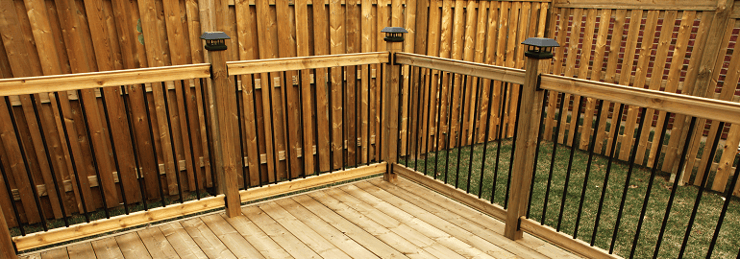
Stock image.
Jacksonville, FL—Jurors Tuesday found a North Florida landlord largely responsible for the broken back a college student suffered in a fall from a rental home’s deck, and awarded more than $1.1 million for her injuries. Fournier v. Derazi, 2013CA010759.
The award, which includes $205,000 for Amanda Fournier’s medical expenses and $900,000 for her pain and suffering, stems from a 12-foot fall from a deck at a rental home owned by Shahab Derazi. Fournier, a 17-year-old University of North Florida student when the fall occurred in 2013, claims the deck’s railing gave way as she rested her hand on it during a house party thrown by Derazi’s tenant.
The fall left Fournier with spinal compression fractures that required surgery and may require additional surgery as she ages. Fournier's attorney, Avera & Smith's Mark Avera, requested about $3.1 million in damages during Tuesday's closing arguments.
The Florida Fourth Circuit Court jury in Duval County deliberated for less than two hours before reaching its decision, which apportioned 80% of the blame to Derazi and 5% to Fournier. Jurors found fraternity Pi Kappa Phi, which was not a defendant at trial but whose members threw the house party, 15% responsible.
The apportionment of fault will likely reduce the post-verdict award to $884,000.
Tuesday's award was far higher than the $150,000 Derazi's legal team offered in pre-trial settlement talks, or the $300,000 offer the defense submitted before closing arguments, Avera told CVN after the verdict.
With Fournier claiming she fell because the deck's railing was not secure, the five-day trial focused largely on the deck’s stability and who bore responsibility for the rail giving way.
During Tuesday’s closing arguments, Derazi’s attorney, Stone Glass & Connolly’s Michael Glass, detailed testimony from both Derazi and the home’s previous owner describing the railing as sturdy. Glass reminded jurors that both Derazi and Travis Maple, a worker Derazi hired to replace deck planks and stairs months before the fall, said they examined the railing and considered it safe. Noting previous fraternity parties held on the deck, Glass said, “Never once did anybody ever complain or have an incident with the railing.”
Glass argued that, rather than merely placing a hand on the railing, Fournier had stumbled and broke through the railing after she had been drinking. Glass reminded jurors two witnesses testified she fell backward into the railing while carrying a drink she had been given. “I know what did not happen. Ms. Fournier did not put a hand on this railing and it failed,” Glass said. ”There’s no dispute [from] these two witnesses that she fell into the railing.”
But Avera argued the deck’s poor construction and maintenance, and not an alcohol-fueled stumble, caused the fall. During Tuesday’s closings, Avera said Fournier had been at the party less than 30 minutes and had taken only a few sips of the drink she had been given. He also told jurors testimony proved she was standing within two feet of the deck before the fall. Avera argued that, for Fournier to be traveling with force necessary to break a sturdy railing from two feet away, “She either needs to be playing running back for the Jacksonville Jaguars, or she’s been hit by a linebacker.”
Instead, Avera said expert testimony proved improperly secured brackets and screws caused the railing to break. While Avera noted the landlord had thrown away sections of the railing involved in the accident, he walked jurors through photos of other sections of the deck taken before and after the fall, highlighting spots where railing hung unattached to supports. Reminding jurors that Maple, the repairman Derazi hired, was not a licensed contractor, Avera noted Derazi never had the deck professionally inspected. “This is putting your head in the sand, and then when something bad happens, saying ‘I didn’t know. I couldn’t know,’” Avera said. “It wasn’t a question of if this was going to happen. It was a question of when."
After the verdict, Avera told CVN he believed Derazi's failure to secure permits or professional inspections of the deck and its repairs played a key role in the jury's decision. “If you’re a juror, you have to wonder, why would you not at least call and ask if a permit was necessary, considering the scope of the work," Avera said. "One reason is you don’t want a building inspector out there nosing around, inspecting your deck, a deck for which there had never been a permit pulled, ever."
Avera added he believed Derazi's destruction of portions of railing involved in the accident may have been the most important factor in the jury's verdict. "[Derazi], notwithstanding having very clear letters of preservation directed to him and counsel, and pending emails for further inspection of the railing and its component parts, decided to throw it away," Avera said. "[That decision] didn't help them, that's for sure."
Glass did not respond to a request for comment as of this article's publication.
Email Arlin Crisco at acrisco@cvn.com.
Related Information
Amanda Fournier is represented by Avera & Smith’s Mark Avera.
Shahab Derazi is represented by Stone Glass & Connolly’s Michael Glass.
Not a subscriber?
Learn how you can watch blockbuster trials, in Florida and across the country.





